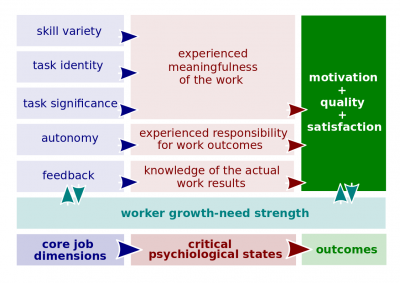Difference between revisions of "Job Characteristics Model"
(→Related coursework) |
|||
| Line 9: | Line 9: | ||
*[[Autonomy]]. The degree to which a job provides substantial freedom, independence, and discretion to the individual in scheduling work and determining the procedures to be used in carrying it out. | *[[Autonomy]]. The degree to which a job provides substantial freedom, independence, and discretion to the individual in scheduling work and determining the procedures to be used in carrying it out. | ||
| − | ==Related | + | ==Related lectures== |
*[[Talent Management Quarter]]. | *[[Talent Management Quarter]]. | ||
[[Category: Septem Artes Administrativi]][[Category: Articles]] | [[Category: Septem Artes Administrativi]][[Category: Articles]] | ||
Revision as of 15:18, 4 January 2019
Job characteristics model (hereinafter, the Model) is a framework for analyzing and designing jobs that identifies five core job dimensions, their interrelationships, and their impact on outcomes. These core job dimensions include skill variety, task identity, task significance, autonomy, and feedback.
Definitions
According to Organizational Behavior by Robbins and Judge (17th edition),
- Job characteristics model. A model that proposes that any job can be described in terms of five core job dimensions: skill variety, task identity, task significance, autonomy, and feedback.
Components
- Skill variety. The degree to which a job requires a variety of activities so that an employee can use a number of different skills and talents.
- Autonomy. The degree to which a job provides substantial freedom, independence, and discretion to the individual in scheduling work and determining the procedures to be used in carrying it out.
